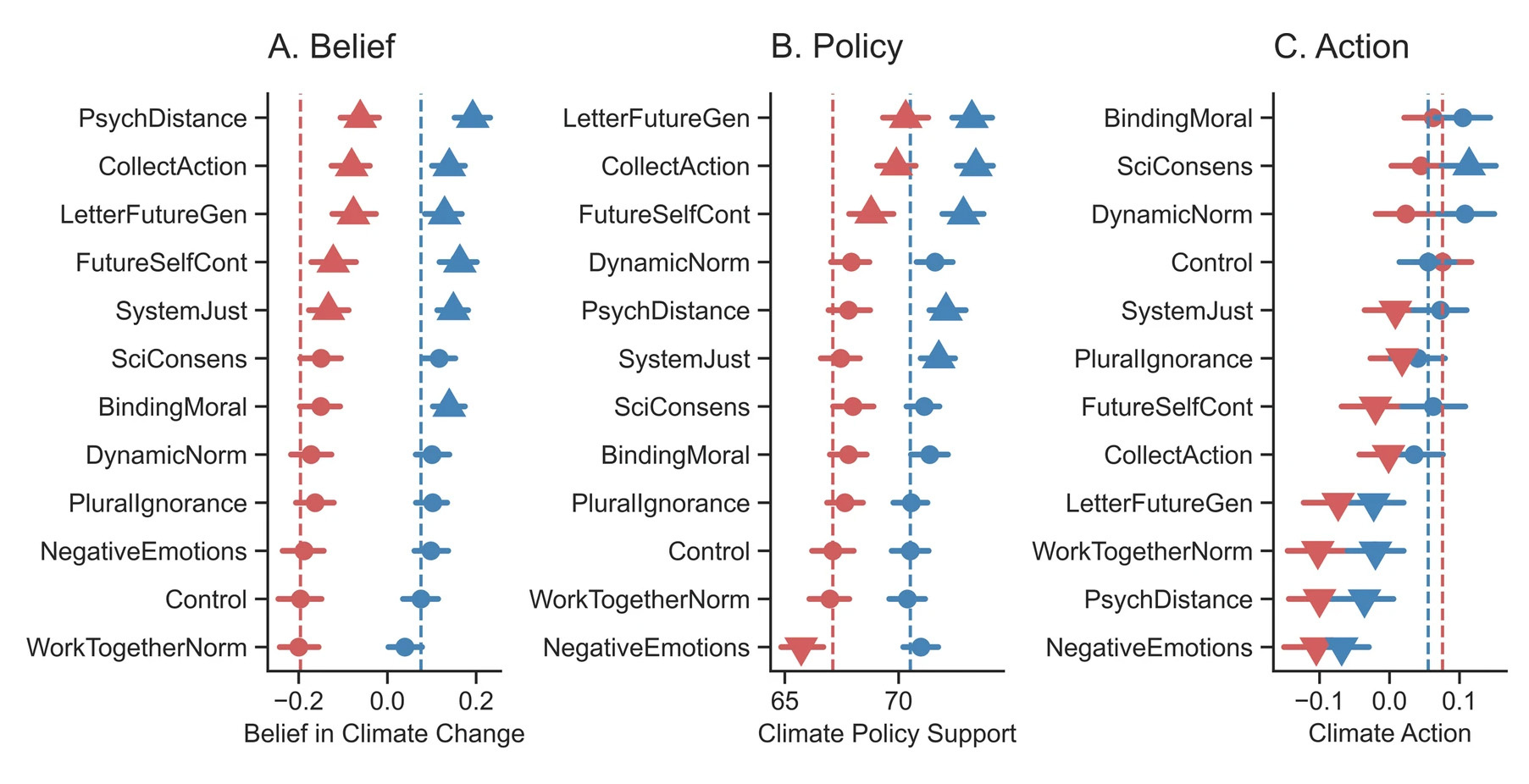Bridging the Green Gap: When Climate Actions Go Beyond Beliefs
Published in Social Sciences and Behavioural Sciences & Psychology

It is generally thought that people with politically liberal beliefs accept the reality of anthropogenic climate change. You might think they would also be more likely to engage in real-world climate actions, right? However, our recent findings from a global megastudy, involving over 51,000 participants from 60 countries– one of the largest experiments conducted in climate psychology to date– challenge the straightforward link between beliefs and actions, suggesting a more complex relationship than previously thought.
The Green Gap
This phenomenon, termed the “green gap”, highlights the disparity between what people believe about climate change and their actual climate actions. Our study examined whether the political polarization evident in climate change beliefs manifests as polarization regarding climate actions, such as investing effort and time to generate tree-planting donations. The "green gap" hypothesis explores scenarios where liberals who believe strongly in climate change may not engage as expected in climate actions, while skeptical conservatives might still participate in actions that benefit the environment.
Our study tested eleven targeted interventions developed by experts in the behavioral sciences, psychology, and beyond. Some examples include promoting scientific consensus (e.g., presenting information that 99% of experts agree on climate change facts), writing a letter to future generations (e.g., thinking about how one’s current actions impact future generations), and emphasizing collective actions (e.g., featuring examples of successful collective efforts that have solved past global issues, such as the restoration of the ozone layer). We observed worldwide polarization in climate change beliefs and policy support, with liberals generally showing higher levels of both compared to conservatives. Encouragingly, belief and policy support were relatively high overall, exceeding 75%. However, this polarization did not extend to the amount of effort and time invested in a climate-relevant task—liberals and conservatives were equally likely to engage in the tree-planting donation task.

Conservative Actions Beyond Beliefs
These findings challenge the traditional belief-behavior congruence hypothesis, which suggests that a person's actions are directly influenced by their beliefs. Instead, the green gap suggests that factors such as cognitive biases [1], perceived personal costs [2], and social norms [3] can disrupt the direct translation of environmental beliefs into environmental action. Further, the mismatch between climate skeptics’ beliefs and behaviors has also been documented, for example, with conservative farmers adopting pro-environmental practices despite lacking belief in anthropogenic climate change [4].
So, who is to blame for this effect? Are liberals failing to put their money where their mouth is and act on their strong beliefs in climate change? Or are conservatives more inclined to engage in climate mitigation actions than their beliefs alone might suggest? Our data align more closely with the latter—conservatives acting despite their beliefs, rather than liberals not acting on theirs.
This is promising news for environmental efforts: the political resistance to accepting climate change or supporting climate policies does not necessarily translate into a behavioral resistance to engaging in at least one type of individual-level climate action. This may be driven by pragmatic environmentalism. While conservatives may not partake in climate actions (like tree-planting) primarily due to their beliefs about climate change—often polarized by media and party lines—they may engage for reasons that align with conservative values, such as preserving natural beauty [5]. Additionally, conservative skepticism towards systemic interventions, perceived as governmental overreach, motivates participation in direct actions like tree planting, which allow them to contribute positively without endorsing large-scale government policies.
Effectiveness of Psychological Interventions
However, we are not solely dependent on existing beliefs and behaviors. While interventions like writing to future generations increased both conservative and liberal support for climate policies, emphasizing the scientific consensus spurred action only among liberals. This highlights the necessity of ideologically tailored approaches in promoting climate beliefs and behaviors. For instance, interventions that reduced psychological distance or promoted future-self continuity showed positive effects on both liberal and conservative climate beliefs and policy support.
Interestingly, while these interventions helped bridge the belief gap, conservative actions were paradoxically reduced by several interventions that otherwise bolstered their climate beliefs or policy support. The fact that no single intervention significantly boosted conservative climate actions suggests that future research is needed to develop and test new methods to activate this demographic’s practical engagement with climate solutions, without necessarily relying on changing their underlying beliefs.

However, it is not only political ideologies that need to be considered when tailoring intervention strategies! For example, baseline levels of belief in climate change (i.e., before an intervention is administered) have also been shown to impact the effectiveness of these interventions [6]. Additionally, factors such as national identity, gender, and level of education have all previously been identified as relevant in influencing various climate change beliefs and behaviors [7]. To help make sense of this and to easily explore the effects of our interventions across the globe, we have created a simple, user-friendly web-app that is freely available. This tool allows users to see how effective interventions are in different countries, by age groups, and by political ideologies. While we caution users not to rely on evidence from groups that are too small (e.g., sample sizes should include at least 30 people), it is a powerful, easy-to-use tool that policymakers, academics, journalists, and beyond can use to help better understand the effectiveness of the interventions in their people.
By understanding the underlying values and motivations of different groups, policymakers and activists can craft more effective and inclusive campaigns that not only increase awareness but also motivate real-world action. Rather than trying to eliminate differences in how conservatives and liberals approach climate action– differences which can be unexpectedly beneficial– we should focus on amplifying positive efforts across the spectrum. By engaging conservatives and liberals in ways that align with their respective values—whether it's the pragmatic beauty of conservation or the urgent need for scientific action– we can enhance the collective effort to combat climate change. In doing so, we harness the best of both worlds to foster a more sustainable future for all.
References
[1] Fazio, R. H. Multiple processes by which attitudes guide behavior: The MODE model as an integrative framework. Adv. Exp. Soc. Psychol. 23, 75–109 (1990).
[2] Glasford, D. E. The privileged liberal principle‐implementation gap: How the personal behavior of privileged liberals contributes to social inequality. J. Appl. Soc. Psychol. 52, 865-885 (2022).
[3] Moser, A. K. Thinking green, buying green? Drivers of pro-environmental purchasing behavior. J. Consum. Mark. 32, 167-175 (2015).
[4] Davidson, D. J., Rollins, C., Lefsrud, L., Anders, S., & Hamann, A. Just don’t call it climate change: climate-skeptic farmer adoption of climate-mitigative practices. Environ. Res. Lett. 14, 034015 (2019).
[5] Shrubsole G. The environment and conservative values. In: Boyle D, Crompton T, Kirk M, et al. (eds) Different Politics, Same Planet: Values for Sustainable Development Beyond Left and Right. PIRC, pp.33–44 (2011).
[6] Vlasceanu, M. et al. Addressing climate change with behavioral science: a global intervention tournament in 63 countries. Sci. Adv. 10, eadj5778 (2024).
[7] Hornsey, M. J., Harris, E. A., Bain, P. G. & Fielding, K. S. Meta-analyses of the determinants and outcomes of belief in climate change. Nat. Clim. Chang. 6, 622–626 (2016).
Cover Image
Generated using Midjourney
Follow the Topic
-
Nature Communications

An open access, multidisciplinary journal dedicated to publishing high-quality research in all areas of the biological, health, physical, chemical and Earth sciences.
Ask the Editor – Collective decision-making
Got a question for the editor about Experimental Psychology and Social Psychology? Ask it here!
Continue reading announcementRelated Collections
With Collections, you can get published faster and increase your visibility.
Women's Health
Publishing Model: Hybrid
Deadline: Ongoing
Advances in neurodegenerative diseases
Publishing Model: Hybrid
Deadline: Mar 24, 2026






Please sign in or register for FREE
If you are a registered user on Research Communities by Springer Nature, please sign in